|

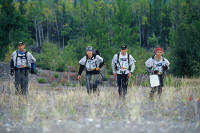 Trekking:
All Raid the North Extreme events are designed with an
"expedition" approach. There are few checkpoints and typically
no restrictions on route choice. We leave the decision-making to
the teams. Although our checkpoints are never hidden (in fact,
they are only ever placed at distinguishable features) the route
between checkpoints is rarely obvious. Planning your route will
be an important and time-consuming task. Aside from hiring a
plane or car, there will be no restrictions at all on route
choice through the trekking sections. Trekking:
All Raid the North Extreme events are designed with an
"expedition" approach. There are few checkpoints and typically
no restrictions on route choice. We leave the decision-making to
the teams. Although our checkpoints are never hidden (in fact,
they are only ever placed at distinguishable features) the route
between checkpoints is rarely obvious. Planning your route will
be an important and time-consuming task. Aside from hiring a
plane or car, there will be no restrictions at all on route
choice through the trekking sections.
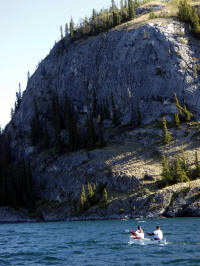 Paddling: Paddling regularly offers us
the most opportunity and the most challenge. We design water
sections in response to the wilderness available in the region.
Coastal regions open the potential for kayaking legs, but only
where risks of ocean paddling are mitigated by sheltering
islands or reefs, or by strickly using inlets or fjords. Canoes
are the most common vessel for paddling, and often provide the
most route choice and the enjoyment of a good portage. Packrafts
have been common features of our events, as an optional piece of
gear carried by teams and used when crossing a body of water is
faster than trekking around. In past events, we've included
historic watercraft such as Voyageur Canoes in northern Ontario
and Dory rowboats in Newfoundland. Paddling: Paddling regularly offers us
the most opportunity and the most challenge. We design water
sections in response to the wilderness available in the region.
Coastal regions open the potential for kayaking legs, but only
where risks of ocean paddling are mitigated by sheltering
islands or reefs, or by strickly using inlets or fjords. Canoes
are the most common vessel for paddling, and often provide the
most route choice and the enjoyment of a good portage. Packrafts
have been common features of our events, as an optional piece of
gear carried by teams and used when crossing a body of water is
faster than trekking around. In past events, we've included
historic watercraft such as Voyageur Canoes in northern Ontario
and Dory rowboats in Newfoundland.
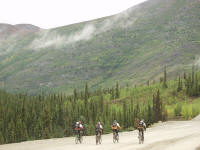 Mountain
Biking: Biking routes will range from easy, meandering
railway trails or country roads, to aggressive, muddy
singletrack. We often seek out abandonded logging roads that
have grown in to provide great doubletrack routes, but which are
often part of complex networks that must be carefully navigated.
Teams may find themselves on snowmobile trails, ATV routes,
historic horse trails or other animal tracks. We do not include
hike-a-bike sections purely for the 'challenge'; this occurs
only when it's the most sensible way to connect two separate
routes. Mountain
Biking: Biking routes will range from easy, meandering
railway trails or country roads, to aggressive, muddy
singletrack. We often seek out abandonded logging roads that
have grown in to provide great doubletrack routes, but which are
often part of complex networks that must be carefully navigated.
Teams may find themselves on snowmobile trails, ATV routes,
historic horse trails or other animal tracks. We do not include
hike-a-bike sections purely for the 'challenge'; this occurs
only when it's the most sensible way to connect two separate
routes.
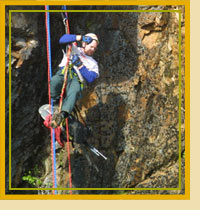 Fixed Ropes: Raid the North Extreme
generally features several heart-stopping ropes sites, including
rappeling, zip line, tyrolean traverses, and less often,
ascending. Fully qualified ropes rigging experts manage our
ropes sites to ensure absolute safety of the site, as well as to
ensure competitors are geared up and properly prepared for each
fixed rope activity. Skills required for the race will be tested
at registration prior to the race, and any certifications
necessary will be communicated well in advance to all teams. Fixed Ropes: Raid the North Extreme
generally features several heart-stopping ropes sites, including
rappeling, zip line, tyrolean traverses, and less often,
ascending. Fully qualified ropes rigging experts manage our
ropes sites to ensure absolute safety of the site, as well as to
ensure competitors are geared up and properly prepared for each
fixed rope activity. Skills required for the race will be tested
at registration prior to the race, and any certifications
necessary will be communicated well in advance to all teams.
Navigation: Navigation is a very
important element of all Raid the North Extreme races. Our goal
is to provide teams with a unique and natural wilderness
experience. We also have a strong commitment to a "leave no
lasting trace" philosophy. We put no markings on the racecourse
(so nothing can be left behind) and we make no new trails or
obstacles. Teams are challenged by the natural landscape and
wilderness. This means navigation skills are a must and teams
must be
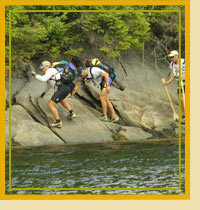 familiar with routefinding and feature reading in
natural wilderness environments. Although trails exist in some
of the areas you will be travelling through, few of them are
marked on the maps. In the course instructions provided just
prior to the race, we include descriptions of any known trails
that are not shown on the map and could have a significant
impact on the speed of teams through that section. We do this to
eliminate the "luck" factor in navigation. We do not want some
teams to have a significant advantage because they accidentally
found an unmarked trail that took them a significant distance in
the right direction. Indirect trails, trails shown on the maps
provided or wildlife trails are NOT described in the competitor
directions, however. As with most 1:50,000 scale maps of
wilderness areas, it is not expected that the maps provided will
be a complete representation of all features your team will
encounter. Interpreting the accuracy of maps is one of the
fundamental challenges of wilderness navigation. familiar with routefinding and feature reading in
natural wilderness environments. Although trails exist in some
of the areas you will be travelling through, few of them are
marked on the maps. In the course instructions provided just
prior to the race, we include descriptions of any known trails
that are not shown on the map and could have a significant
impact on the speed of teams through that section. We do this to
eliminate the "luck" factor in navigation. We do not want some
teams to have a significant advantage because they accidentally
found an unmarked trail that took them a significant distance in
the right direction. Indirect trails, trails shown on the maps
provided or wildlife trails are NOT described in the competitor
directions, however. As with most 1:50,000 scale maps of
wilderness areas, it is not expected that the maps provided will
be a complete representation of all features your team will
encounter. Interpreting the accuracy of maps is one of the
fundamental challenges of wilderness navigation.

|





